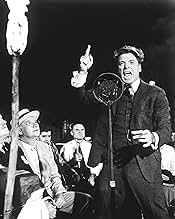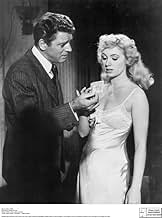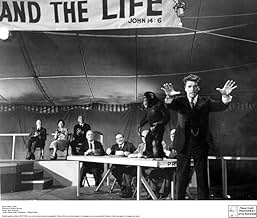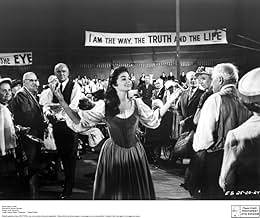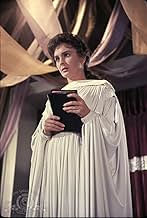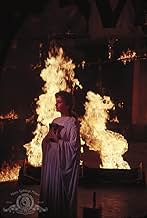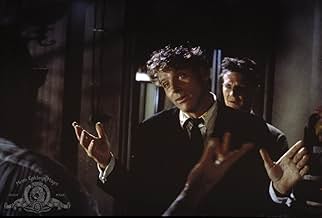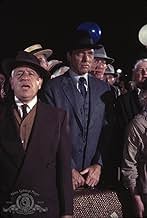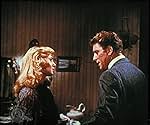Un venditore porta a porta con la parlantina e delle maniere loquaci e affascinanti convince una sincera evangelista che lui può essere un giusto predicatore per la sua causa.Un venditore porta a porta con la parlantina e delle maniere loquaci e affascinanti convince una sincera evangelista che lui può essere un giusto predicatore per la sua causa.Un venditore porta a porta con la parlantina e delle maniere loquaci e affascinanti convince una sincera evangelista che lui può essere un giusto predicatore per la sua causa.
- Regia
- Sceneggiatura
- Star
- Vincitore di 3 Oscar
- 11 vittorie e 14 candidature totali
- George F. Babbitt
- (as Ed Andrews)
- Salesman in Saloon
- (non citato nei titoli originali)
- Mac - Bartender
- (non citato nei titoli originali)
- Cornerman
- (non citato nei titoli originali)
- Congregation Member
- (non citato nei titoli originali)
Recensioni in evidenza
Burt Lancaster player the greatest role of his career, getting his only Oscar for his performance. Lancaster, so good in such films as From Here to Eternity, Atlantic City, and Seven Days in May, was spellbinding as the salesman for God.
Shirley Jones (The Music Man, "The Patridge Family," was simply delicious as Gantry's first conquest, and now a "five-buck hooker," that he left behind: "Oh, he gave me special instructions back of the pulpit Christmas Eve. He got to howlin' "Repent! Repent!" and I got to moanin' "Save me! Save me!" and the first thing I know he rammed the fear of God into me so fast I never heard my old man's footsteps!" 1960 was a great year for movies, and this was certainly one of the best of that year, and one of the best of all time. If you want to see real acting, this film should be on your "must-see" list.
All you need to know about the character of Elmer Gantry is neatly summed up in the first 10 minutes of the film. The film opens as we see Gantry holding court around a table in a bar, telling jokes and anecdotes of sexual conquests one minute, and then the next minute is helping out two wayward parishioners by passing the hat around the bar and preaching in earnest the word of God. Lancaster plays out the duality in the role of Gantry as everyman/ preacher brilliantly throughout the film. We're witness to his meteoric rise within the ranks of the religious road show, we see his stumbles within those ranks and his eventual fall from popularity to an even more impossible grace under fire (literally), but most importantly we see the ability of his character to serve both his rise and fall in ways truly unexpected.
Gantry finds that there are many who will listen to him wax eloquent on the bible. But when Gantry sees Sister Sharon Falconer (as played by Jean Simmons) he forgets about getting closer to the lord and decides to ingratiate himself into her 'inner circle'. Gantry can see that the 'old time religion show' is a soul saver on Sunday, but quite a moneymaker on Monday. There are 'two very different' Gantry's, the one who has a lifetime of sexual anecdotes and the other who's true love is for the bible. What we are not in store for is the third Gantry; the one in love with Elmer Gantry and his own voice. In any case, Gantry sees a golden opportunity to satisfy all three Gantry's and he goes for it. Through his ability to con and sweet talk his way to the top, Gantry makes all of the right friends and maneuvers himself to a spot underneath Sister Sharon Falconer.
Gantry's fall comes in the form of Lulu Baines (as played by Shirley Jones), a prostitute with a past history with Gantry. As Gantry's popularity on the 'road show' circuit starts to hit its zenith, Baines appears into Gantry's life once again as she sets up Gantry for blackmail. How Gantry deals with Baines and the loss of trust from Sister Sharon is one of the best moments from the film. And although her time on screen doesn't come close to matching that of both Lancaster and Simmons, it is the performance of Jones in one scene that practically steals the show. Jones' speech to the ladies in the brothel about Gantry "Ramming the fear of God so fast" into her was exhilaratingly fun and mildly erotic. I would think it was largely this scene that got her noticed by the Academy in 1960.
However great Lancaster is as Gantry (Oscar winning performance) and spectacular Jones is as Baines (another Oscar winner), let us not forget how easy it would have been for this movie to have THREE Oscar WINNERS!!! Yes, Jean Simmons was robbed by the Academy that year. I think there are at least three reasons as to why Jean Simmons was not given the Oscar that year. One is the brutally lame ending to the movie. Sister Sharon is left to walk about the fiery inferno of her newly built church, while everyone around her is knocking her to the ground trying to escape. Sister Sharon is oblivious to human stampedes and is more concerned in urging everyone to remain calm. A performance that must not have been lost on John Landis when he made Kevin Bacon reprise it in 'Animal House' some 18 years later (sans the fire). It was a shame to see her babbling like an idiot while certain death surrounded her. That's one reason, but the other two reasons are probably more to the truth. You see, Jean Simmons wasn't the only actress who can claim to have been robbed on Oscar night, so could Shirley Maclaine. The Oscar could have gone to either one, but if it had gone to Jean Simmons, The Academy would've had a hard time giving any award to the 'The Apartment' or its director Billy Wilder. How could 'Elmer Gantry' win three of the four main awards yet not walk away with the Best Picture? It's also been said the Academy felt bad for Elizabeth Taylor as she was not only recovering from the recent death of her husband, Michael Todd, but also that she had just needed an emergency tracheotomy only weeks before the awards. However, one point should be clear, Elizabeth Taylor never should have won the Oscar over the performances that year from Simmons or Maclaine.
Another performer from the movie who gives a great performance is Arthur Kennedy as Jim Lefferts. Lefferts is the skeptical newsman who follows the 'road show' waiting to see a miracle or perhaps to see many a false prophet fall. One scene that stands out is the scene where Lefferts is dictating an article on the exploits of Lancaster and Simmons' religious road show. While he is dictating he is also absent-mindedly sharpening a pencil. As Lefferts comments become to take on more of a cynical tone, the pencil in his hand also becomes sharper. Once Lefferts is through with his thought, the pencil has been sharpened to a fine point and his thoughts are ready for print. He writes, "Is it a church, is it a religion or is it a circus sideshow complete with freaks, magic and rabble rousing?
This is a fine film with a slightly disappointing ending. I can't accept that the errant fling of a cigarette can flash through the heavens like a message from God, but if ever a bolt of lightning was captured onto the silver screen, it was the bolt from Burt Lancaster as Elmer Gantry. 9/10.
Clark Richards
I think this logic might explain why revivalism is so fervent in America, most of the small-town folks wouldn't fancy an alternative to an after-world where the good isn't rewarded and the evil punished, God fabricated men in its own image so it's only fair that men built a society that works in the same way than God, even if God can act in mysterious ways... let's face it, even the most sophisticated ones of us wouldn't figure out a universe where religion, as complex as it is, wouldn't be easy to "pitch", no matter how tempting agnosticism could be.
This is why promoting revivalism in the hearts of Americans isn't the most difficult thing to operate, it all comes down to telling people that they're going to burn in hell if they sin and to save their souls if they repent, people are ready to hear that if the words come from the right mouths, it's like a good cop/bad cop routine. In Richard Brooks' "Elmer Gantry", adapted from the novel of the same name by Sinclair Lewis, the good cop is Jean Simmons as Sister Sharon Falconer, a saintly revivalist who talks in sweet and delicate prose, and handles her followers and her endeavor like a businessman would do, and there's the bad cop, but one hell of a smooth-talker named Elmer Gantry.
In the original novel, he was an ordained Minister, in the film, in order to appease the Hays Code, he's an ex-Bible salesman who learned the voices of Gospel from scratch and is capable to infuse Bible passages in every monologue, with a grin that would convince the devil himself to sing Halleluiah. To call Gantry charismatic is an understatement, the casting of Burt Lancaster is perfect if only for providing him that irresistible smile, one so charming that it can get away with the scariest threats or allow an improvised line about love to become his catchphrase and play like a running gag all through the film.
What works even better in Lancaster's performance is that his intents are rarely clear and a big cloud of mystery floats around his solid shoulders. His character-establishing moment occurs when he convinces a bunch of drunkards to give charity money to old Christian ladies during a Xmas celebration. With his smile, he manages to skim money off a few piles without even asking, working like the gangster who'd get anything with a smile rather than a threat. Before, he was telling naughty jokes and after, he would have sex with Lulu Baines (Shirley Jones), a hooker who couldn't resist his words, a move that would backfire at him later. Gantry is irresistible indeed, but he's a swindler and I'd say about him what I say about Fellini's "Bidone", before you find them sympathetic, keep in mind it's part of their job.
So Gantry drifts from a place to another until he meets Sister Shara and has an epiphany. He cons her into believing he can attract the crowds with a "saved salesman" speech, Gantry brings crowds indeed and makes arrangements with Zenith church leaders, convincing her that religion must be a spectacle and must bring money in order to survive, and then we get to a second act where it's all about the spectacular improvisation of Lancaster and the professional talent of Simmons, religion turns out to be a big circus, where even the enthusiasm of the audience is part of the show. Lancaster and Jones won the Oscar but Jean Simmons was sure robbed of a nomination and even Arthur Kennedy as the no-nonense big-city reporter Lefferts had a few interesting sequences as the man of reason in the midst of that huge cacophony.
Yes, because there's a lot of noise in the film and this is why it never ceases to be entertaining, so many speeches like a "Network" of the 60s, the noise of religious frenzy, of media craving for sensationalism, of cheering and booing, of "Glory Glory Halleluiah", the film was directed the same year than "Inherit the Wind" but the handling of religion and religious figures is in such a hyperbolic way we might suffer from dizziness, especially when romantic feelings get mixed up and the film culminates with a third act where the ugliness implodes on everyone, what goes around...
This all leads to the inevitable confrontation between good ol' truth and ol' time religion... but the film (like "Inherit the Wind") tries to give the two sides a fair trial, even avoiding to make a total scam out of Gantry and keep him sympathetic even when he's truly guilty of manipulation. But isn't it all about manipulation after all? Media, businessmen, corporations, public opinion, religion, are all institutions guided by noble intentions but that couldn't keep on going without money. Some things exist because they have to... and because they need to exist must count on the shadiest ambassadors, ironically, Gantry was the most human of all, especially with his weakness for a good drink.
The film explores all the facets and allows each side to be given a fair treatment but it also shines by its punchy script, gutsy approach and an unforgettable performance by Burt Lancaster aka "The Grin", a hard-drinking fellow who embodied an aspect of religion that can echo Homer's statement about alcohol as the cause and the solution to all men's problem. Cheers!
Burt Lancaster commands the screen: all flashing teeth, athletic energy, charisma, and wild hair, using his own physical prowess to great advantage. The angelic and lovely Jean Simmons, who had legions of adoring male fans when she was in her ethereal prime, portrays Sister Sharon (loosely based on a well-known real-life revivalist of the early 1920's, Aimee Semple McPherson, about whom I'd heard from my grandmother) in a manner reminiscent of her character in "Spartacus" - she was the perfect choice for this role, as was Lancaster for his.
Shirley Jones was awarded the Best Supporting Actress Oscar for her lively portrayal of prostitute Lulu Bains, whose past history with Gantry comes back to haunt him, with some of the best lines in the film - gleefully laughing as she dances about a room full of her fellow prostitutes, she recounts that "He rammed the fear of God into me so fast I never heard my old man's footsteps!" Watching Burt Lancaster in his prime use his athletic ability (he was a circus acrobat before he became an actor) and physical grace helps make his performance truly electrifying. And he also manages to believably evolve Elmer Gantry from loud-mouthed salesman to a sympathetic and honest human being over the course of the film.
The top-notch supporting cast includes Arthur Kennedy, Patti Page, Dean Jagger, and John McIntire.
Lo sapevi?
- QuizWhen he first learned that Richard Brooks was interested in adapting his novel, Sinclair Lewis told him that he should change it significantly, advising him to read all the criticisms of the book and use them as a way to improve on it.
- BlooperThe location where Sister Sharon confronts the police captain and fire chief over erecting her tent is purported to be in Lincoln Nebraska. The opening part of the scene shows mountains in the background. There are no mountains around Lincoln.
- Citazioni
Lulu Bains: Oh, he gave me special instructions back of the pulpit Christmas Eve. He got to howlin' "Repent! Repent!" and I got to moanin' "Save me! Save me!" and the first thing I know he rammed the fear of God into me so fast I never heard my old man's footsteps!
- Curiosità sui creditiScrolled before the opening credits: "We believe that certain aspects of Revivalism can bear examination- that the conduct of some revivalists makes a mockery of the traditional beliefs and practices of organized Christianity! We believe that everyone has a right to worship according to his conscience, but- Freedom of Religion is not license to abuse the faith of the people! However, due to the highly controversial nature of this film, we strongly urge you to prevent impressionable children from seeing it!"
- ConnessioniFeatured in Hollywood: The Fabulous Era (1962)
- Colonne sonoreI'm On My Way to Canaan Land
(uncredited)
Traditional
Arranged by Mahalia Jackson
Sung by Patti Page and the audience at a revival meeting
Reprised by her at the end
I più visti
- How long is Elmer Gantry?Powered by Alexa
Dettagli
- Data di uscita
- Paese di origine
- Lingua
- Celebre anche come
- Elmer Gantry, ni bendito ni maldito
- Luoghi delle riprese
- Azienda produttrice
- Vedi altri crediti dell’azienda su IMDbPro
Botteghino
- Budget
- 3.000.000 USD (previsto)
- Lordo in tutto il mondo
- 64 USD
- Tempo di esecuzione2 ore 26 minuti
- Proporzioni
- 1.66 : 1
Contribuisci a questa pagina



